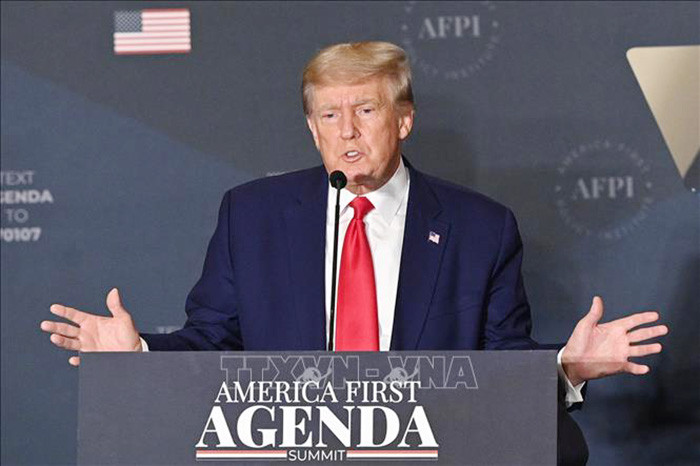During this election campaign, former President Donald Trump's team actively contacted Republican Party members at the state level to win the necessary number of delegates to become the official candidate of this party.

Former US President Donald Trump speaks at a conference in Washington, DC, US, July 26, 2022
Polling numbers aside, fundraising numbers and name recognition have been the near-perfect gauge of former President Donald Trump’s early dominance in the fierce race to become the Republican Party’s nominee. He appears to have the most important advantage in the race: securing the delegates needed to secure the Republican nomination.
More than 2,000 party activists, insiders and officials will vote at the Republican National Convention next summer to formally select a nominee. The rules for selecting delegates will be determined at the state level, and there is a deadline in October to submit plans for next year’s election.
Although the delegate count won’t be known until voting begins next January, Mr. Trump’s advantage in the race for the nomination has been building for years. Many state Republican parties changed their rules ahead of the 2020 election, all of which favored the current front-runner, a position Mr. Trump has held despite mounting legal threats, the party’s lackluster performance in 2022 and the tumultuous years of his presidency.
In Michigan, the Republican Party leadership this year voted to change the state’s longstanding process of allocating all delegates based on an open primary. Under a new plan widely expected to benefit Mr. Trump, 16 of the state’s 55 delegates will be awarded based on the results of the primary on Feb. 27. The remaining 39 seats will be announced four days later in caucuses. Republicans in other states are also looking to move from primaries to caucuses, where the support of grassroots activists for Mr. Trump could put his party’s rivals at a disadvantage.
In Idaho, one of the most Republican states in the US, a new law passed by the state legislature earlier this year eliminated the presidential primary process by moving the state election to May.
In Nevada, the state Republican Party is waging a legal battle to hold a caucus instead of a primary. Party Chairman Michael McDonald said he has been in touch with Trump’s team about the process and that the legal battle is ongoing. He also said he has not received a response from the campaign of Florida Governor Ron DeSantis, Trump’s strongest opponent.
During his campaign, former President Trump’s team has been in regular contact with state party chairs and hosted Republican delegations in Nevada, Louisiana, Pennsylvania, Florida and New Jersey. The moves are a sign that Trump’s team is focused on the key aspects of winning the Republican nomination, a notable change from his first run for the White House in 2016.
Trump senior adviser Chris LaCivita said the campaign has been in conversations with state parties about delegate selection plans and is monitoring the actions of his opponents. LaCivita made a trip to Las Vegas in May to speak to a group of hundreds of Nevada Republicans.
Trump has also taken steps to cultivate relationships with potential 2024 delegates in the party, including phone calls and dinner invitations. Also in May, former President Trump hosted a private dinner for Iowa’s attorney general, local lawmakers and election officials. A similar reception was held in South Carolina for 75 people, including Gov. Henry McMaster, state lawmakers and party activists.
“We are aggressive at every level and on every front. We leave no one to chance. From a tactical point of view, the position we are in today is a quantum leap compared to a similar campaign in 2016,” LaCivita stressed.
According to Tin Tuc Newspaper